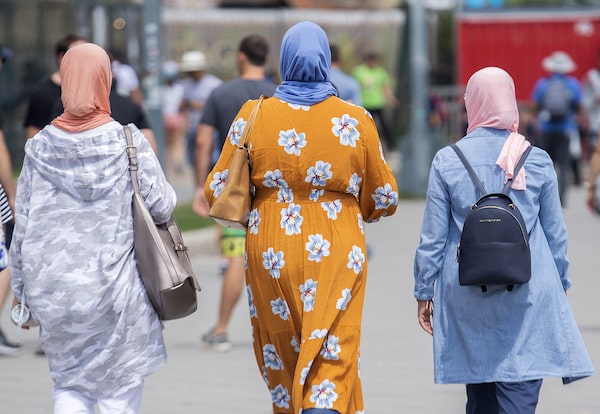
Women wearing hijabs walk in the Old Port in Montreal in 2022.Graham Hughes/The Canadian Press
Quebec’s Court of Appeal has upheld a provincial law that prohibits many civil servants from wearing religious symbols on the job, in a major victory for Premier François Legault.
Mr. Legault’s government used the notwithstanding clause in the Canadian Charter of Rights and Freedoms when it passed the law in 2019, prompting widespread condemnation across the country. It is widely expected to end up at the Supreme Court of Canada.
The Act respecting the laicity of the State, also known as Bill 21, imposes state religious neutrality and applies to civil servants holding “positions of authority,” including teachers, police officers, government lawyers and others. Under the law, people in those jobs who wear the symbols and already hold those posts are allowed to keep working. But they cannot be promoted or transferred, and new hires must remove the religious symbol to work.
Several groups, including the Canadian Civil Liberties Association and the National Council of Canadian Muslims, launched a constitutional challenge and denounced the law’s effects on religious minorities. The Superior Court upheld most of the law in 2021.
The Court of Appeal published a 290-page decision Thursday, agreeing with the earlier ruling that found the Quebec government’s use of the Constitution’s notwithstanding clause shields Bill 21 from discrimination-based legal challenges.
“No doubt, the fact that a legislature can exempt a statute from the application of certain provisions of the Canadian Charter or the Quebec Charter … is cause for reflection, if not discomfort,” a panel of three justices acknowledged in a unanimous decision.
But they ruled that the law is nonetheless constitutional.
In a video posted on social media after the ruling, Mr. Legault said that the court “confirmed Quebec’s rights to make its own decisions, so it’s really a beautiful victory for the Quebec nation.” He said that his government will continue to use the notwithstanding clause “for as long as it takes for Canada to recognize the nation of Quebec’s societal choices.”
Federal Justice Minister Arif Virani said in a statement that he expects the parties will seek leave to appeal and confirmed that Ottawa “will be there to defend the Charter before the Supreme Court.”
“Our government has serious concerns with the pre-emptive use of the notwithstanding clause,” Mr. Virani said.
Thursday’s ruling agreed with the lower court’s decision that the law’s requirement for MNAs to “exercise their functions with their face uncovered” violates citizens’ constitutional right to serve in the National Assembly, no matter what their faith is. The notwithstanding clause does not apply to Charter provisions protecting democratic rights.
But, unlike the Superior Court, the Court of Appeal found that Bill 21 does not infringe on Quebec’s English-speaking minority’s rights to manage their education system. The 2021 decision had carved out an exception from the law for the anglophone education system, which Mr. Legault had denounced.
Opponents said they were disappointed with the ruling.
The non-profit World Sikh Organization of Canada said in a news release that it “maintains that Bill 21 is a direct attack on religious freedom and will continue to fight this unjust law.”
Sikh Quebeckers who wear dastaars – turbans – “have reported increased hostility and discrimination in all facets of their lives,” the WSO said. Thursday’s decision “sets a troubling precedent for the treatment of minority communities across the country.”
Joe Ortona, chair of the English Montreal School Board, said Bill 21 goes against the board’s values, and that it will soon decide whether to file an appeal to the Supreme Court. “It’s disappointing today, but this might not be the end of the road,” he said.
The Canadian Civil Liberties Association said in a statement that this ruling “represents a painful setback in our ongoing fight against discrimination,” and said it remained committed to “pursuing all necessary legal avenues available” to challenge Bill 21.
Sylvie St-Amand, president of the Quebec Women’s Federation, said in a statement that the Court of Appeal “has denied Muslim women the right to live and work in the clothing of their choice.” She said Bill 21 reinforces “violence and Islamophobia” against these women.
Proponents of the law, on the other hand, celebrated Thursday’s decision. “We’re very happy,” said Luc Alarie, a lawyer for the Quebec Secular Movement, which advocates for secular policies. “We couldn’t ask for more.”
Legal experts were divided on the ruling.
Vrinda Narain, a constitutional law professor at McGill University, said the decision “seems disengaged from constitutional values” and that rights “must be upheld to protect all Canadians, all Quebeckers, not just some.”
However, the Supreme Court is likely to uphold the decision, Dr. Narain said, because it remains “sensitive to federalism and allowing Quebec to make its own decisions.”
Daniel Turp, a constitutional law professor at the University of Montreal, said the decision was legally sound and he agreed with the Court of Appeal’s narrow view of minority language rights.
But whether the Supreme Court will uphold Bill 21 is anyone’s guess, Dr. Turp said, as the Court of Appeal’s decision sits at odds with Canada’s notion of multiculturalism.